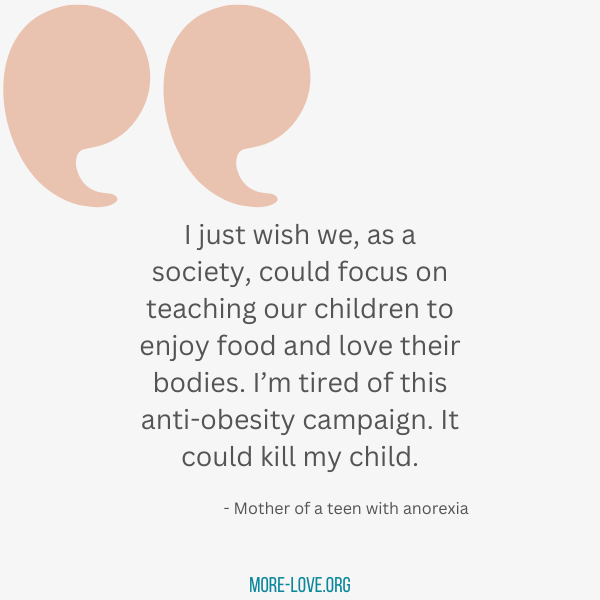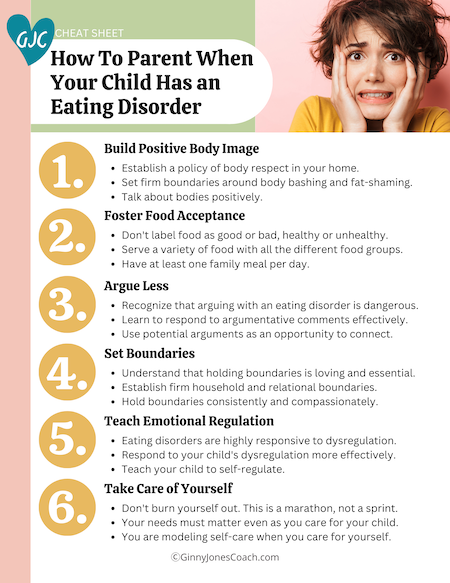
This is a story about a 13-year-old teenager who developed anorexia and how her family worked to overcome the eating disorder with Family Based Treatment, or FBT. This is an evidence-based treatment for anorexia that is both challenging and effective. Here’s one family’s story of how FBT helped their teenager recover from anorexia:
By Anonymous
My daughter had a brain tumor at age two. It caused morning vomiting through age 6.* She survived due to early intervention. This included craniotomies and physical therapy.
She was diagnosed with social anxiety at age 6. She refused to drink water at school because she did not want to use the bathroom at school. I remember her telling me about a teacher who commented negatively on her snack of a cupcake. She also had a paraeducator telling her that sugar is as addictive as cocaine.
These are some of the memories I have that help me make sense of the anorexia. It seemed to develop in a matter of weeks.
Free Download: How To Parent A Child With An Eating Disorder
The 6 basic steps you need to follow to help your child recover from an eating disorder.
We compiled a list for the doctor:
- Changes in diet (won’t eat whipped cream, butter, regular cheese, ham)
- Cooks, but doesn’t eat what she makes
- Eats really slowly and seems to play with food more than eat. After she eats, it looks like a mess (food all over the place)
- Eats really small portions
- Feels guilty after eating (cries)
- Fascinated by cooking shows and recipes, but doesn’t eat
- Does jumping jacks after eating
- Smells like fingernail polish remover
- Moody and Emotional
- Seems cold and wears big jackets all the time
- Sleeps a lot
- Wants me to take her to the gym all the time
- When she takes off her big sweatshirt, I’m shocked because she’s very thin
My husband and I met with the doctor first. He asked us if we have a scale in the house. We do. He told us to take it out of the house. Once it’s gone, she notices it is missing and I say it’s broken. It has been “broken” ever since.
Visiting the doctor when your teen has anorexia
That night, I tell my daughter that we are going to see the doctor. When I check her phone I find that she has visited a website that tells her how to “cheat the doctor.” I’m devastated. I’m angry. She just got the phone a few weeks ago, and this is what she’s looking up? This is the moment I am certain that my daughter has an eating disorder.
The doctor meets with my daughter and evaluates her. He tells her she needs to gain weight. At home, she spends hours crying. He calls later and says she needs blood work and an EKG. He gets her admitted to the hospital. We feel relief. The children’s hospital doctors tell me that my daughter is very ill. She must be hospitalized for at least 5 days, but maybe a few weeks. She is told she must eat or she will get an NG tube. There is no negotiating or pleading, this is just the way it is.
Our story of using family based treatment for our teen’s anorexia
Anorexia nervosa is a monster and it has a stronghold on my daughter. It also has a 20% mortality rate (often suicide). This is the highest for any mental illness, so I’m scared to death of it taking my daughter’s life.
She’s 13. The best chance of recovery from anorexia is Family Based Treatment, or FBT. This includes intensive meal support, and we parents oversee three meals and three snacks daily. I check for hidden food (sleeves, cheeks, pockets, trash can, etc). I check that food is eaten and swallowed (mouth check before leaving the table).
After leaving the table, she has to sit with the family and play a game, watch TV or do homework. She is not allowed to use the bathroom (for fear of purging or flushing food she somehow hid). We can’t let her go to her room, because she does jumping jacks to compensate for the meal she just ate.
About FBT for a teen with anorexia
Family-based treatment (FBT), also referred to as the Maudsley method or Maudsley approach, is widely regarded as the preferred treatment for adolescents with anorexia. FBT is a structured outpatient therapy aimed at helping adolescents recover with the active involvement of their parents. The central objective of FBT is to facilitate weight restoration, making it a feasible alternative to residential treatment. Research shows that Family-based treatment (FBT) is an effective intervention for adolescents diagnosed with anorexia nervosa, but it requires strenuous action by parents and is best done with support from a trained therapist, RD, or coach.
So much sadness
Our daughter is suffering and there is a lot of crying and sadness.
We have to encourage her to eat at a decent pace (ideally less than 30 minutes). She wants to cut her food in tiny pieces. She’ll move it around her plate and let it fall to the floor. We make her eat it at a swift pace. She is not allowed to plate her food and must eat everything on her plate. In fact, everyone at the table has to clean their plate.
We band together as a family, my husband, myself and my 10 year old. We fight the monster (anorexia) that wants to starve my child. My child who has anorexia can not help with grocery shopping or food preparation. I black out the calorie content of any prepared package food I serve to her.
She tells me about low fat alternatives and wants to eat vegan. We do not allow this, but we allow her to choose 3 foods that she can refuse to eat. The food she chooses to reject are tomatoes, bananas and eggs.
Pulling together as a family
Every week, we attend family based therapy. At the beginning of each session my daughter is weighed. If she puts on 1-2 pounds, we parents are applauded, and my daughter cries the rest of the session. If she does not put on weight, she smiles and we work with the counselor to develop new strategies.
Free Download: How To Parent A Child With An Eating Disorder
The 6 basic steps you need to follow to help your child recover from an eating disorder.
I learn that is difficult for an adolescent to put on weight. So I buy high calorie snacks and nutritional drinks to help with the weight gain. The counselor tells us that we cannot only serve “safe” foods (pop-chips, salad, whole wheat pasta with lean chicken). We must also serve “fear” foods (caramel, chocolate, soda pop and pizza). We give her fear foods when we are feeling strong enough to take on the monster. Sometimes I trembled after those meals.
The impact of family based treatment for anorexia
My younger daughter misses eating pizza and ice cream with her older sister. She seems sad as her older sister’s personality changes for the worse. At one time, my younger child told me she wished she could die. I realize it is really important to get her out of the house away from the disease. Trouble is, she doesn’t want to leave. Perhaps she is scared of losing her sister?

What I wish I knew before my teenager developed anorexia
The stress gets to me and I see a counselor for anxiety. I see a medical doctor for anxiety medication and an occupational therapist. I developed Irritable Bowel Syndrome and suffer from frequent back aches.
The only part of my life that is a break from the disease, my job, is something I felt forced to resign from. There were so many appointments (individual counseling, nutrition therapy, family counseling and medical). And my manager felt I wasn’t pulling my share of the weight at work. FMLA would have protected my job during this period of intense caregiving. But before I knew of the illness, I switched jobs. I was still on probation when she was diagnosed.
After eight months of FBT, the family counselor thought it best for the me to send my daughter away for therapy full time. I felt some relief at the thought of a break, but my daughter started gaining weight after we talked about “sending her away”.
Sometimes I find moldy food hidden in slippers or spit in trash cans and I cry. Will the anorexia take my child’s life?
We share very little about the disease with friends, for fear of adding to my daughter’s stress. Our goal is to avoid exposing her to the potential stigma associated with mental illness. We feel very isolated.
Free Download: How To Parent A Child With An Eating Disorder
The 6 basic steps you need to follow to help your child recover from an eating disorder.
The story of recovery from anorexia for our teenager
We sign up to be volunteers at the local food bank. She enjoys volunteering and we make it a routine. She wants to play volleyball, go to the gym, or play softball. As she gains weight, she is allowed to practice softball for an hour a week. Hours are added back based on her recovery.
Eventually, 13 months in, she hits her fear weight and she doesn’t cry. She asks us to buy her candy. The monster seems to be gone.
At a healthy weight
Now it is 17 months later and my daughter is much better. At her last medical visit she was a very healthy weight. Her fear foods are no longer and we don’t supervise every meal. She can play softball everyday after school and she can participate in PE class.
She still has problems making and keeping friends. Recently, when she broke with a good friend, we caught her drinking from our hard alcohol. Now we lock our alcohol in a safe. We have made contact with a counselor at school who would love to help her. She is refusing further counseling, so we decide to limit her freedoms instead.
I cringe at every mention of “clean” or “healthy” food or trendy diets. I just wish we, as a society, could focus on teaching our children to enjoy food and love their bodies. I’m tired of this anti-obesity campaign. It could kill my child.
References
* A recent study conducted by USC found that pediatric brain tumor patients face increased risk of interpersonal and emotional distress.
- 25% of respondents reported that the patient had trouble making and keeping friends
- 20% reported that the patient feels isolated and alone.
Interpersonal and emotional distress has been correlated with teenagers with eating disorders. So while this child’s childhood illness is not a stand-alone “cause,” it is an important part of this family’s anorexia story.

Ginny Jones is the founder of More-Love.org, and a Parent Coach who helps parents who have kids with disordered eating and eating disorders. Combining science, compassion, and experience coaching hundreds of families, she helps parents understand what’s going on with their kids’ eating behaviors and teaches them the science-backed skills to heal kids’ relationship with food, improve their body image, and feel better about themselves, their relationships, and life in general.
Ginny has been researching and writing about eating disorders since 2016. She incorporates the principles of neurobiology and attachment parenting with a non-diet, Health At Every Size® approach to health and recovery.


Thank you for sharing. I needed to feel hope today.
Sending you so much love as you navigate through this!
We have had a similar experience and are in recovery with our eleven year old but worry it seems to be creeping back. Not an easy road and so hard but as a family you can beat this awful thing
Yes – eating disorders can be overcome. Sending you strength and love as you go through this! xoxo
What to do when she refuse to eat, throw it on the wall etc and get really angry? What to do?
That’s a really difficult situation – I’m so sorry. I’m not able to answer the question adequately here, but please reach out if you would like to schedule a coaching call with me. You can find information here: http://www.ginnyjonescoach.com
Thanks a lot for sharing, you really gave me hope
Thank you so much for sharing this. My daughter was diagnosed at 10 and got better. She is now 13 and the disease is rearing its ugly head again. She is 67 pounds and think she’s fat.She has temper tantrum’s in public and he’s extremely nasty and abusive to my husband and I. I have never seen her like this before. Your article gives me hope. Thank you so much again for sharing.